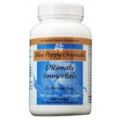Ultimate Immortals
60 capsules x 5000mg. from Blue Poppy Originals
Indications: Menopausal syndrome, hot flashes and night sweats, fatigue, insomnia, irritability, and depression.
Applications in Traditional Chinese Medicine:
Pattern: menopausal syndrome due to liver blood-kidney yin and yang vacuity complicated by spleen qi vacuity and liver depression.
Classical antecedent: Er Zhi Xian Fang
The signs and symptoms of liver-kidney yin vacuity are:
Hot flashes
Vexatious heat in the five heartsNight sweats
Possible tinnitus and/or dizziness
Insomnia
Low back aching and soreness
A pale tongue with red tip or a red tongue with scanty, possibly yellow and/or dry fur
A fine, rapid or surging, possibly rapid pulse
The signs and symptoms of kidney yang vacuity are:
Cold feet
Nocturia
Decreased sexual desire
A deep pulse in the right cubit position
Signs and symptoms of spleen qi vacuity include:
fatigue, especially after eating
cold hands and feet
abdominal bloating after eating
lack of strength in the four extremities
tendency to loose stools but possibly constipation
dizziness when standing up
a swollen tongue with teeth marks on its edges
easy bruising
fine pulse which is often soggy a or soft in the right bar position
The signs and symptoms of liver depression include:
lower abdominal distention/cramping
irritability
rib-side ain
premenstrual breast distention and pain
a bowstring pulse
chest oppression
Formula explanation: Er Xian Tang was originally created at the Shu Guang Hospital in Shanghai for the treatment of menopausal hypertension but to lack of regulation between the chong and ren associated with liver blood-kidney yin and yang vacuity. In our version, Anemarrhena and Phellodendron clear vacuity heat
and enrich the essence by leading upwardly stirring ministerial fire back down to its lower source. Curculigo and Epimedium supplement the liver and kidneys, invigorate yang, and nourish the blood, thus filling the essence. Dang Gui nourishes and quickens the blood, and, "The blood and essence [have] a common source."
The ingredients in Er Zhi Wan consist of Eclipta and Ligustrum. These two medicinals strongly nourish the blood and enrich yin. In addition, Eclipta clears heat and cools the blood. These two medicinals supplement yin but are not either slimy or stagnating as is Radix Rehmanniae (Di Huang). Since spleen vacuity commonly complicates most Western cases of menopausal syndrome, this is an important consideration. Gan Mai Da Zao Tang is the main Chinese formula for the treatment of visceral agitation. Visceral agitation is typically seen in females either at adolescence or menopause and describes a paroxysmal mental state characterized by melancholy, depression, and emotional lability. The ingredients in Gan Mai Da Zao Tang include mix-fried Licorice, blighted Wheat, and Red Dates. Licorice supplements the spleen and heart qi, while Red Dates supplement the spleen and nourish heart blood. Together, these two medicinals nourish, construct, and quiet the heart spirit. Blighted Wheat likewise supplements the heart and quiets the spirit. In addition, it astringes yin and stops abnormal sweating.
To this base are added Oyster Shell and Dragon Bone to astringe yin and stop sweating, settle the spirit and quiet the mind, subdue yang and downbear counterflow. Albizzia and Caulis Polygoni both quiet the spirit by nourishing the heart and resolving depression. In addition, Albizzia quickens the blood. Melia helps course the liver and rectify the qi without plundering yin the way Radix Bupleuri (Chai Hu) might. The liver’s coursing and discharging is also aided by yang’s warming and steaming of the liver and all the blood-supplementing medicinals’ nourishing of the blood. The liver can only function if A) it is warmed and steamed by ministerial fire and B) it obtains sufficient blood to nourish its function. Ginseng and Poria both supplement the spleen, thus supplementing the heart and quieting the spirit. Finally, Dioscorea supplements the spleen and kidney qi without being drying the way Rhizoma Atractylodis Macrocephalae (Bai Zhu) would be. Perimenopausal kidney yang vacuity is an evolution of spleen qi vacuity. This spleen qi vacuity does not suddenly disappear when vacuity detriment "reaches the kidneys." Thus the kidney yang vacuity of menopausal syndrome is really a spleen-kidney yang vacuity.
When these medicinals are used together, they nourish liver blood, invigorate and enrich kidney yin and yang, for-tify the spleen and boost the qi, nourish the heart and quiet the spirit, harmonize and soften the liver and subdue yang.
To get the most out of this treatment, the patient also needs to adhere to a yeast-free, sugar-free, clear bland diet for at least three months, and better for 6-12 months. In particular, the patient should avoid chilled, uncooked foods, greasy, fatty foods, and sweets. In addition they should get regular physical exercise combined with regular deep relaxation and stress reduction.
Ingredients:
Fu Xiao Mai (Fructus Levis Tritici)
Mu Li (Concha Ostreae)
Long Gu (Os Draconis)
Ye Jiao Teng (Caulis Polygoni Multiflori)
He Huan Pi (Cortex Albiziae)
Nu Zhen Zi (Fructus Ligustri Lucidi)
Han Lian Cao (Herba Ecliptae)
Da Zao (Fructus Jujubae)
Fu Ling (Poria)
Zhi Mu (Rhizoma Anemarrhenae)
Huang Bai (Cortex Phellodendri)
Xian Mao (Rhizoma Curculiginis)
Xian Ling Pi (Herba Epimedii)
Dang Gui (Radix Angelicae Sinensis)
mix-fried Gan Cao (Radix Glycyrrhizae)
Shan Yao (Radix Dioscoreae)
Chuan Lian Zi (Fructus Toosendan)
Ren Shen (Radix Ginseng)
Dosage:
2 capsules, 2 times a day
Package:
60 capsules x 5000mg. (500mg. x 10:1 concentration ratio)
Note: All Blue Poppy brand products come with the manufacturing date marked (MFG or Manuf. Date), the expiration date is 5 years from the date indicated on the bottom or side of the packaging.

